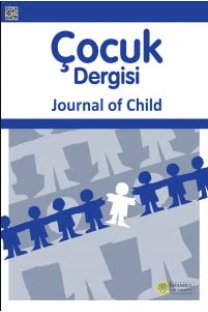Lenfadenopatiye Yaklaşım: Vaka Sunumu ve Literatürün Gözden Geçirilmesi
Lenfadenopati, çocuk
Approach to Lympadenopathy: Case Report and Literature Review
Lympadenopathy, child,
___
- Perkins SL, Segal GH, kjeldsberg cr. Work-up of lymphadenopathy in children. Semin Diagn Pathol 1995;12:284-7.
- Twist cJ, Link mP. Assessment of lymphadenopathy in children. Pediatr Clin North Am 2002;49:1009-25.
- https://doi.org/10.1016/S0031-3955(02)00038-X
- Nield LS, kamat d. Lymphadenopathy in children: when and how to evaluate. Clin Pediatr (Phila) 2004;43:25-33.
- https://doi.org/10.1177/000992280404300104
- Germaine Lm, Newhouse JH. Castleman’s disease. Clin Imaging 2003;27:431-4.
- Leung Ak, robson WL. Childhood cervical lympha- denopathy. J Pediatr Health Care 2004;18:3-7.
- https://doi.org/10.1016/S0891-5245(03)00212-8
- Lake Am, oski FA. Peripheral lymphadenopathy in childhood. Ten-year experience with excisional biopsy. Am J Dis Child 1978;132:357-9.
- https://doi.org/10.1001/archpedi.1978.02120290029003
- Screaton NJ, Berman LH, Grant JW. Head and neck lymphadenopathy: evaluation with US-guided cutting- needle biopsy. Radiology 2002;224:75-81.
- https://doi.org/10.1148/radiol.2241010602
- du Toit G, Swingler G, ıloni k. Observer variation in detecting lymphadenopathy on chest radiography. Int J Tuberc Lung Dis 2002;6:814-7.
- Gupta rk, Naran S, Lallu S, Fauck r. Diagnostic value of needle aspiration cytology (NAC) in the assessment of palpable inguinal lymph nodes: a study of 210 cases. Diagn Cytopathol 2003;28:175-80.
- https://doi.org/10.1002/dc.10244
- oksuz rYc, dağdemir A, Acar S, Elli m, oksuz m. Çocukluk çağı periferik lenfadenopatili vakaların ret- rospektif değerlendirilmesi. OMU Tıp Dergisi 2008;25: 94-101.
- Brady z, Taylor mL, Haynes m, et al. The clinical application of PET/CT: a contemporary review. Australas Phys Eng Sci Med 2008;31:90-109.
- https://doi.org/10.1007/BF03178584
- ISSN: 1302-9940
- Yayın Aralığı: Yılda 4 Sayı
- Başlangıç: 2000
- Yayıncı: İstanbul Üniversitesi
Yaşamı Tehdit Eden Sistemik Lupus Eritematozus Vakasında Rituksimab Tedavisi
Cemile PEHLİVANOĞLU, Ilmay BİLGE, Bağdagül AKSU, Alev YILMAZ, Zeynep YÜRÜK YILDIRIM, Yasin YILMAZ, Işın KILIÇASLAN, Sevinç EMRE
Sütçocukluğu Döneminde Ağır Vitamin B12 Eksikliğine Bağlı Ensefalopati Vakası
Ayşegül DOĞAN DEMİR, Selçuk UZUNER, Nilüfer GÖKNAR, Ufuk ERENBERK, Akın İŞCAN, Ayşe ARALAŞMAK, Metin KARABÖCÜOĞLU
Çocukluk Çağında Guillain-Barré Sendromu
Muhammet Ali VARKAL, Edibe YILDIZ, İsmail YILDIZ, Nur AYDINLI, Emin ÜNÜVAR
Çocukluk Çağı Ender Hastalığı: Gorham-Stout Sendromu
Agageldi ANNAYEV, İsmail YILDIZ, Muhammet Ali VARKAL, Oğuz Bülent EROL, Ayşe KILIÇ, Fatma OĞUZ, Emin ÜNÜVAR
Akut Poststreptokoksik Glomerulonefrite Bağlı Gelişen Reverzibl Posteriyor Ensefalopati Vakası
Ayşegül DOĞAN DEMİR, Nilüfer GÖKNAR, Selçuk UZUNER, Ufuk ERENBERK, Ahmet Zahit GÖKSU, Türkan UYGUR ŞAHİN, Akın İŞCAN, Faruk ÖKTEM
Lenfadenopatiye Yaklaşım: Vaka Sunumu ve Literatürün Gözden Geçirilmesi
Selime AYDOĞDU, Tuğçe GÖKSU YILMAZ, Deniz TUĞCU
Yenidoğanda Nonepileptik Paroksismal Olay
